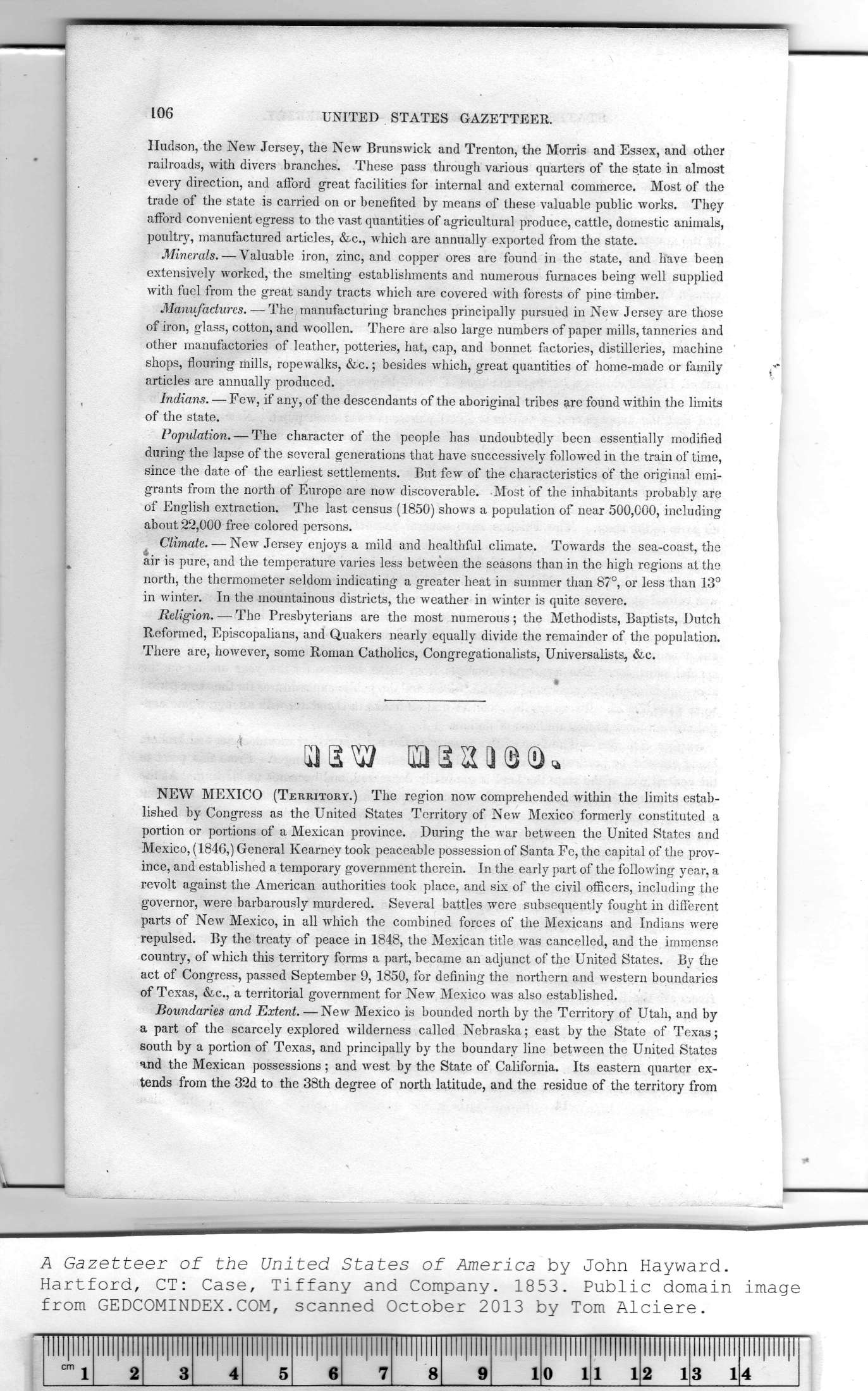|
|
Note: Ctrl and + increases the font size of the text below, Ctrl and - decreases it, and Ctrl and 0 resets it to default size.
106 UNITED STATES GAZETTEER.
Hudson, the New Jersey, the New Brunswick and Trenton, the Morris and Essex, and other
railroads, with divers branches. These pass through various quarters of the state in almost
every direction, and afford great facilities for internal and external commerce. Most of the
trade of the state is carried on or benefited by means of these valuable public works. They
afford convenient egress to the vast quantities of agricultural produce, cattle, domestic animals,
poultry, manufactured articles, &c., which are annually exported from the state.
Minerals.—Valuable iron, zinc, and copper ores are found in the state, and have been
extensively worked, the smelting establishments and numerous furnaces being well supplied
with fuel from the great sandy tracts which are covered with forests of pine timber.
Manufactures. — The manufacturing branches principally pursued in New Jersey are those
of iron, glass, cotton, and woollen. There are also large numbers of paper mills, tanneries and
other manufactories of leather, potteries, hat, cap, and bonnet factories, distilleries, machine
shops, flouring mills, ropewalks, &c.; besides which, great quantities of home-made or family
articles are annually produced.
Indians. — Few, if any, of the descendants of the aboriginal tribes are found within the limits
of the state.
Population. — The character of the people has undoubtedly been essentially modified
during the lapse of the several generations that have successively followed in the train of time,
since the date of the earliest settlements. But few of the characteristics of the original emi-
grants from the north of Europe are now discoverable. Most of the inhabitants probably are
of English extraction. The last census (1850) shows a population of near 500,000, including
about 22,000 free colored persons.
Climate. — New Jersey enjoys a mild and healthful climate. Towards the sea-coast, the
air is pure, and the temperature varies less between the seasons than in the high regions at the
north, the thermometer seldom indicating a greater heat in summer than 87°, or less than 13°
in winter. In the mountainous districts, the weather in winter is quite severe.
Religion. — The Presbyterians are the most numerous; the Methodists, Baptists, Dutch
Reformed, Episcopalians, and Quakers nearly equally divide the remainder of the population.
There are, however, some Roman Catholics, Congregationalists, Universalista, &c.
Ga a a q q ©»
NEW MEXICO (Territory.) The region now comprehended within the limits estab-
lished by Congress as the United States Territory of New Mexico formerly constituted a
portion or portions of a Mexican province. During the wrar between the United States and
Mexico, (1846,) General Kearney took peaceable possession of Santa Fe, the capital of the prov-
ince, and established a temporary government therein. In the early part of the following year, a
revolt against the American authorities took place, and six of the civil officers, including the
governor, were barbarously murdered. Several battles were subsequently fought in different
parts of New Mexico, in all which the combined forces of the Mexicans and Indians were
repulsed. By the treaty of peace in 1848, the Mexican title was cancelled, and the immense
country, of which this territory forms a part, became an adjunct of the United States. By the
act of Congress, passed September 9, 1850, for defining the northern and western boundaries
of Texas, &c., a territorial government for New Mexico was also established.
Boundaries and Extent. — New Mexico is bounded north by the Territory of Utah, and by
a part of the scarcely explored wilderness called Nebraska; east by the State of Texas;
south by a portion of Texas, and principally by the boundary line between the United States
and the Mexican possessions ; and west by the State of California. Its eastern quarter ex-
tends from the 32d to the 38th degree of north latitude, and the residue of the territory from
|
lllllllll |
iiiiiim |
lllllllll |
lllllllll |
lllllllll |
lllllllll |
lllllllll |
lllllllll |
lllllllll |
lllllllll |
lllllllll |
lllllllll |
lllllllll |
lllllllll |
llll|llll|l |
|
cm j |
2 |
3 |
4 |
5 |
6 |
7 |
8 |
9 |
1 |
0 I |
1 1 |
2 1 |
3 1 |
4 |
|
